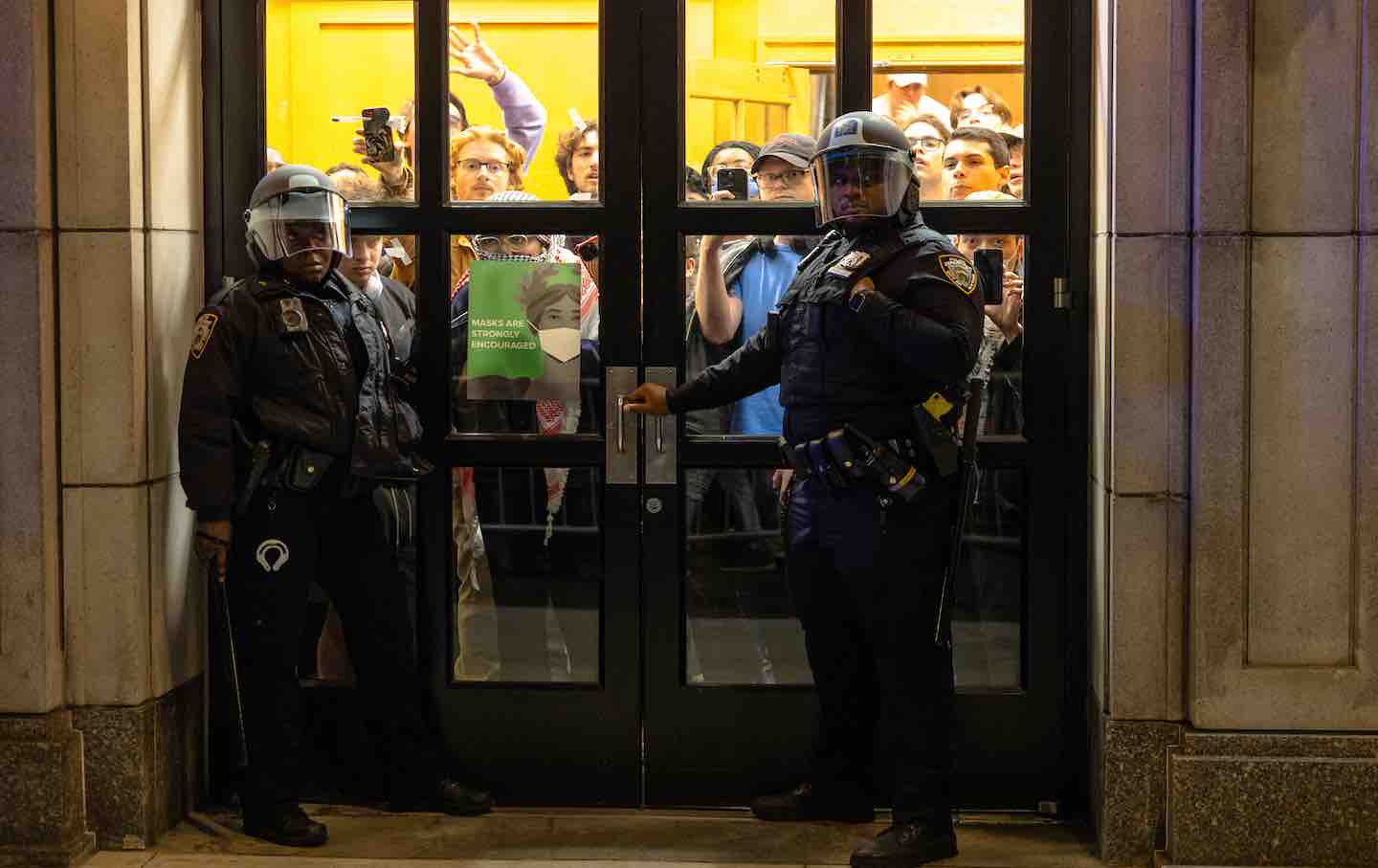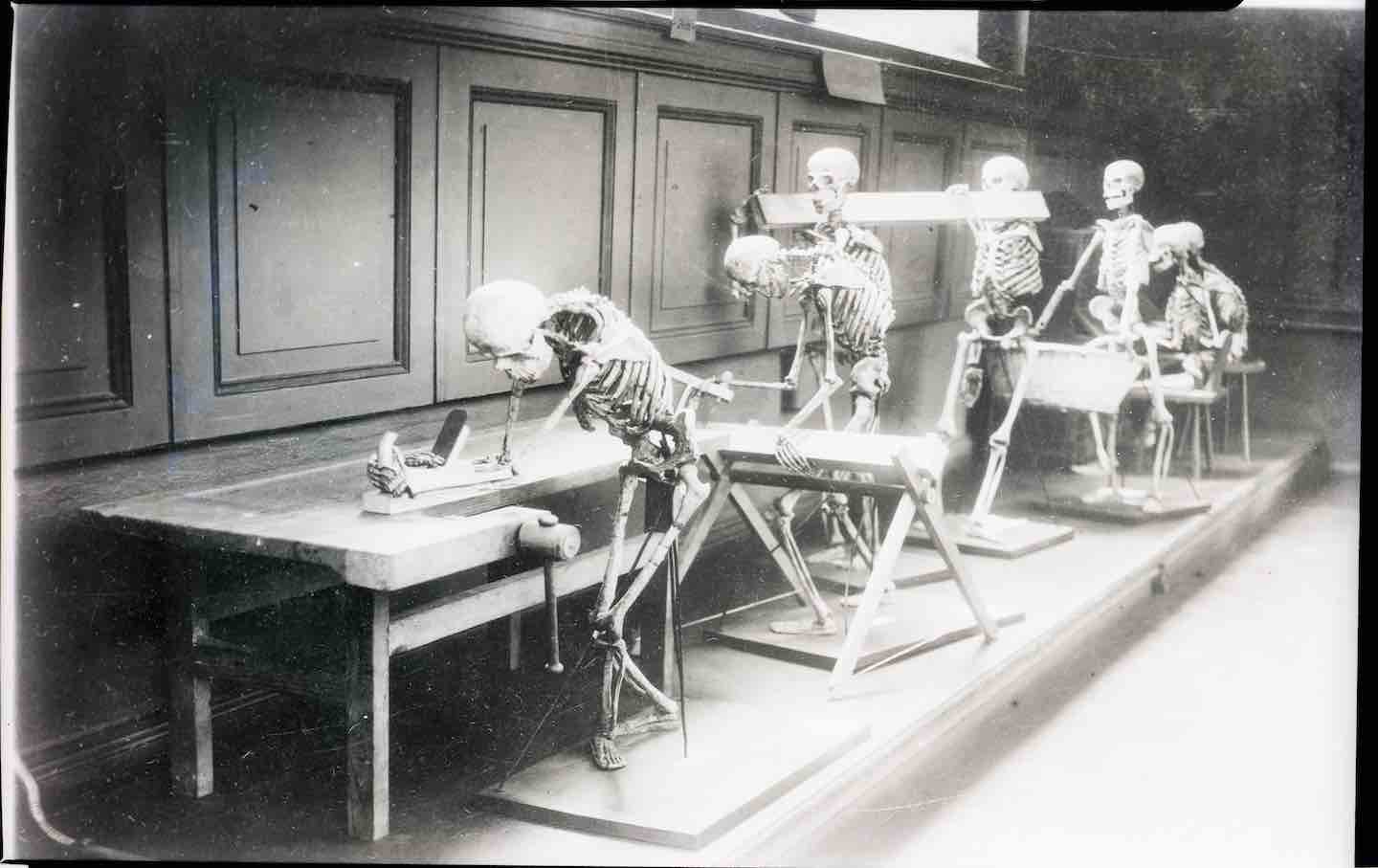A Fantasy of Post-Generational Politics
A recent book argues that reordering the stages of work and life—including retirement—could eradicate conflicts between generations, while ignoring the real issues that divide us.

NYPD preparing to enter Columbia University’s Hamilton Hall, 2024.
(Photo by Michael M. Santiago / Getty Images)“It’s only a mild exaggeration,” writes Mauro Guillén, “to argue that intergenerational conflict could well be to the twenty-first century what the world wars were to the twentieth.” The young blame the old for climate change, while the old believe the young are lazy and irresponsible. But in a battle seemingly fought with avocado toast instead of atom bombs, the greatest tension, according to Guillén, comes from the pension system.
Books in review
The Perennials: The Megatrends Creating a Postgenerational Society
Buy this book“Frictions are proliferating between younger, taxpaying generations and those in retirement enjoying healthcare and pension benefits,” Guillén writes in The Perennials: The Megatrends Creating a Postgenerational Society. Following steady increases in life expectancy, pensioners are living longer than ever, he notes, constituting a greater share of the population. With more retirees and less money, the math—to Guillén, a vice dean and professor at the Wharton School of Business—doesn’t add up. “Longer life spans, combined with falling fertility, represent a formidable double whammy for pension systems.”
Here, Guillén sees an alternative: Rather than fighting against these frictions, why not pull a veil over them, make them disappear? “The pensions problem requires change at the level of the system,” he writes. “That is, departing from the sequential model of life, plain and simple.”
The sequential model—life’s separate successive stages, from play to school to work to retirement—is no longer useful to Guillén, along with the generational labels stemming from it. “There’s nothing naturally preordained about what we should do at different ages,” he writes. “In fact, the sequential model of life is a social and political construction, built on conceptions of patriarchy and bureaucracy that classify people into age groups and roles.”
Modern life is undoubtedly too compartmentalized, and age-based boundaries too rigid—but by abandoning retirement, does Guillén throw the baby boomers out with the bathwater? “The sequential model of life, built on the premise that eventually everyone gets to retire with a decent pension, has simply failed to deliver on such a universalistic promise,” Guillén asserts. “How can a multigenerational society dissolve the problem?”
Enter the Perennials, “people who are not characterized by the decade in which they were born but rather by the way they work, learn, and interact with others.” Under society’s current configuration, the young enter the workforce while their elders eventually exit. Instead, a Perennial society would center on nonlinear life, free “from the tyranny of ‘age-appropriate’ activities”—including retirement.
“Does it make sense to retire at sixty-five? Can we afford it as a society? Is it fair to other generations?” Guillén tends to ask these questions without offering answers, preferring pessimistic caveats: “How will younger generations feel about paying taxes to fund healthcare and pension systems for their parents, grandparents, and great-grandparents?” In the United States, however, the greatest threat to Social Security is not overuse or generational infighting, but deliberate underfunding. The current payroll tax on both workers and employees—which funds the program—cuts off at incomes above $160,200, and abolishing this arbitrary restriction would actually allow workers to retire earlier.
But such a proposal would make for a short book. And, Guillén suggests, young people would never support it. Yet in a March 2023 poll from Data for Progress, a majority of likely voters under 45 believed the retirement age should be lowered, with another third saying it should stay the same. Only 6 percent—presumably business school graduates—thought it should be increased. Not so in the realm of the Perennials, where postponing retirement somehow reduces the potential for intergenerational conflict.
The term “Perennial” was coined in 2016 by Gina Pell, described by Guillén as a “serial entrepreneur.” Both Pell and Guillén think of being a Perennial as a “mindset” and less of “a solution.” With a focus on individual choice, The Perennials is a chimera of business-speak, technophilia, and self-help. This “postgenerational” mindset, for example, is simply “a method” to help “develop new, imaginative approaches to life in the twenty-first century,” Guillen writes, “so that we can unleash the full potential inherent to each of us.” For Guillén, this inherent potential turns out to be largely economic, a question of human capital. “Marketers have tended to assume that their attention should be placed on ‘young’ consumers in their twenties and thirties,” he states. But today, “the center of gravity of consumption is steadily shifting toward the group of people above the age of sixty due to their larger numbers, savings, and purchasing power compared to other generations.” In Guillén’s view, an ideal economic sphere would make all consumers—regardless of age—equally marketable.
But to understand his postgenerational society, Guillén first examines our own. He likens the sequential model to a transit system, shuttling passengers from one stage of life to the next. This linear route doesn’t work for everyone, he writes, be it single mothers or high school dropouts, who, by living life “out of order,” are less likely to be employed, graduate college, or own a home. “They simply missed several trains,” Guillén adds, “leaving them with few or no opportunities to catch up.”
The Perennials are theoretically free from these rigid tracks, able to return to previous stages at no detriment to their security and stability. Guillén’s recurring example is someone seeking higher education: Perennials wouldn’t need to rush into additional schooling immediately and could “pursue not just one career, occupation, or profession but several,” which would lead to a “a new reality in which interns in their sixties can work together with managers in their twenties.”
To make higher education more accessible, tuition-free college and student-loan cancellation might be the obvious first steps. But like the business professor that he is, Guillén opts for a quick fix: artificial intelligence, virtual reality, and “merging online teaching with the blockchain.” He claims that “once we learn how to use it effectively, the metaverse will open an entire array of new possibilities to immerse students in a learning experience hitherto impossible.” Initially a skeptic, Guillén claims to have been convinced of its pedagogical applications after holding his own lecture in virtual reality to promote his last book, 2030: How Today’s Biggest Trends Will Collide and Reshape the Future of Everything. Unfortunately for Guillén, Perennials arrived after the metaverse was revealed as a hollow marketing trick. The crypto-based metaverse platform Decentraland, launched in 2020 and eventually valued at over $1.3 billion, had just a few dozen active daily users by October 2022. “Far from being worth trillions of dollars, the Metaverse turned out to be worth absolutely bupkus,” wrote Kate Wagner in The Nation.
Turning from higher education to the kinds of jobs available to workers, Guillén favorably notes that “before the decade of the 2020s is over, there will be more gig workers…above the age of sixty than below the age of thirty.” For him, “the gig economy has the potential of utterly transforming life for seniors.” He’s correct, but not in the way he imagines. Gig workers are exempt from many federal labor standards; their daily lives, as exposé after exposé has revealed, are transient and difficult. Guillén marvels that older gig workers are also often the ones performing the most backbreaking tasks. “You would think that they’re picking the administrative, customer service work that doesn’t require the physical work,” says an executive at a tech company that places short-term workers with companies, “but they actually do a lot of physical work like fulfillment warehousing and general labor.”
While the common culture between generations has largely eroded, our common concerns remain. More than 8 million student-loan borrowers—often stereotyped as millennials—are 50 and older, owing a combined $400 billion in debt. That same age group now makes up half of homeless single adults, and those over 65 were the only demographic to see an increase in poverty in 2022. The majority of baby boomers and older believe that climate change should be a top priority and that abortion should be legal.
If anything were to have led to the widespread intergenerational conflict Guillén imagines, it might have been the recent wave of student protests in support of Palestinians in Gaza. In April, thousands began occupying their campus lawns and buildings across the country, calling on their universities to divest from Israel. It’s easy to frame these protests as a fight between the young and the old, but it wouldn’t be correct. Students cited the tactics and lessons of anti-Vietnam War organizers in 1968 and the anti-apartheid movement of the 1980’s, and were often joined and defended by their much older professors. Faculty at The New School, for example, even set up an encampment of their own after student protesters were arrested. While mainstream media coverage describes Palestine as a solely youth issue, a permanent ceasefire is supported by young and old voters alike.
Yet every argument in The Perennials also rests on Guillén’s prediction of a “seemingly never-ending increase in life expectancy,” which has steadily declined in the United States, hitting its lowest point in almost 20 years. “Among wealthy nations, the United States in recent decades went from the middle of the pack to being an outlier,” notes an October examination of the subject in The Washington Post. “And it continues to fall further and further behind.”
Popular
“swipe left below to view more authors”Swipe →It’s especially curious that, amid all his prescriptions, Guillén fails to mention Medicare for All—arguably the ultimate postgenerational proposal in contemporary politics—even while attributing the high life expectancy in Italy and Spain to their “widely available primary healthcare.” It’s no coincidence that Medicare for All was the signature policy of octogenarian Bernie Sanders, whose strong cross-generational appeal made him the twice-favorite candidate of voters between 18 and 29. In a society of Perennials, surely everyone—not just those over 65—should have guaranteed healthcare?
The structures that have come to organize and dominate modern life are far from compatible with self-fulfillment and security, but Guillén’s fantasy only entrenches them. Whereas Karl Marx imagined liberated individuals able “to hunt in the morning, fish in the afternoon, rear cattle in the evening, criticize after dinner,” Guillén’s Perennials are software developers as adolescents, college students in middle age, and Uber drivers as senior citizens. For someone comparing intergenerational conflict to the two world wars, Guillén also betrays a curious lack of urgency, reminding readers to “be pragmatic.” Why propose a profound reordering of society and then tell your readers to hold their horses?
“The trouble with the existing system of retirement is that it makes people rely on some combination of Social Security, employer pensions, and personal savings or assets,” Guillén writes, “as opposed to empowering them to be in control of the last two decades of their lives.” Through the warped lens of business-school-speak, gig work is seen as liberation. In this way, “elderly empowerment” follows the pattern of many right-wing projects—the anti-abortion movement, the “right to work,” school choice—by providing a positive patina to a questionable agenda. The underlying austerity—in this case, privatizing Social Security and raising the retirement age—is much more unpopular. By equating the end of retirement with freedom, Guillén paints a stick orange and pretends it’s a carrot. But the trick works better on a willing audience, such as marketing firms and corporate executives. For everyone else, it might not prove so attractive.
We cannot back down
We now confront a second Trump presidency.
There’s not a moment to lose. We must harness our fears, our grief, and yes, our anger, to resist the dangerous policies Donald Trump will unleash on our country. We rededicate ourselves to our role as journalists and writers of principle and conscience.
Today, we also steel ourselves for the fight ahead. It will demand a fearless spirit, an informed mind, wise analysis, and humane resistance. We face the enactment of Project 2025, a far-right supreme court, political authoritarianism, increasing inequality and record homelessness, a looming climate crisis, and conflicts abroad. The Nation will expose and propose, nurture investigative reporting, and stand together as a community to keep hope and possibility alive. The Nation’s work will continue—as it has in good and not-so-good times—to develop alternative ideas and visions, to deepen our mission of truth-telling and deep reporting, and to further solidarity in a nation divided.
Armed with a remarkable 160 years of bold, independent journalism, our mandate today remains the same as when abolitionists first founded The Nation—to uphold the principles of democracy and freedom, serve as a beacon through the darkest days of resistance, and to envision and struggle for a brighter future.
The day is dark, the forces arrayed are tenacious, but as the late Nation editorial board member Toni Morrison wrote “No! This is precisely the time when artists go to work. There is no time for despair, no place for self-pity, no need for silence, no room for fear. We speak, we write, we do language. That is how civilizations heal.”
I urge you to stand with The Nation and donate today.
Onwards,
Katrina vanden Heuvel
Editorial Director and Publisher, The Nation
More from The Nation

The Perils of a Post-Racial Utopia The Perils of a Post-Racial Utopia
In Nicola Yoon’s One of Our Kind, a dystopian novel of a Black upper-class suburb’s secrets, she examines the dangers of choosing exceptionalism over equality.

Why Americans Are Obsessed With Poor Posture Why Americans Are Obsessed With Poor Posture
A recent history of the 20th-century movement to fix slouching questions the moral and political dimensions of addressing bad backs over wider public health concerns.

Thomas Müntzer’s Misunderstood Revolution Thomas Müntzer’s Misunderstood Revolution
A recent biography of the German preacher and leader of the Peasants’s War examines what remains radical about the short-lived rebellion he led.

Is It Possible to Suspend Disbelief at Ayad Akhtar’s AI Play? Is It Possible to Suspend Disbelief at Ayad Akhtar’s AI Play?
The Robert Downey Jr.–starring McNeal, which was possibly cowritten with the help of AI, is a showcase for the new technology’s mediocrity.

Possibility, Force, and BDSM: A Conversation With Chris Kraus and Anna Poletti Possibility, Force, and BDSM: A Conversation With Chris Kraus and Anna Poletti
The two writers discuss the challenges of writing about sex, loneliness, and the new ways novels can tackle BDSM.

Lore Segal’s Stubborn Optimism Lore Segal’s Stubborn Optimism
In her life and work, she moved through the world with a disarming blend of youthful curiosity and daring intelligence.


